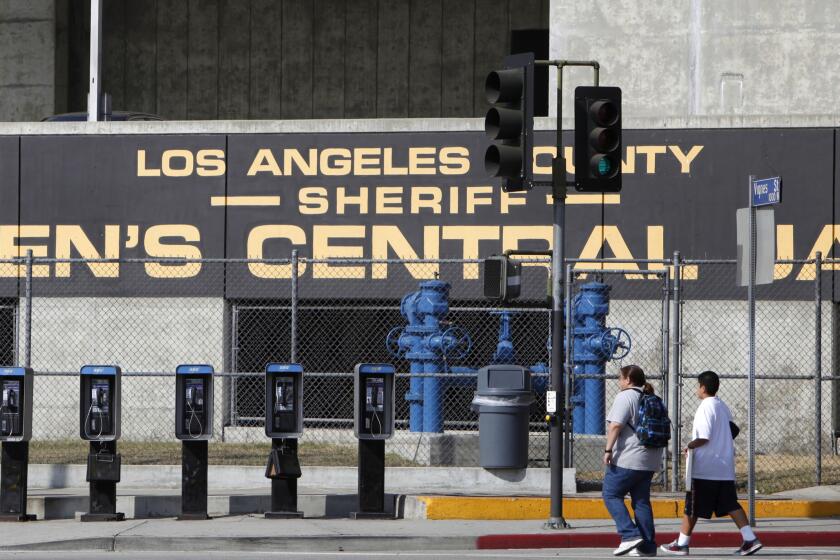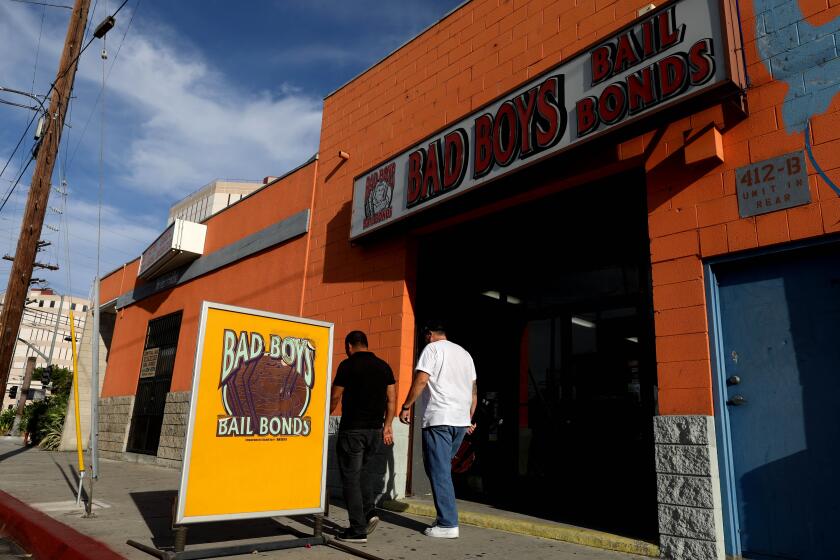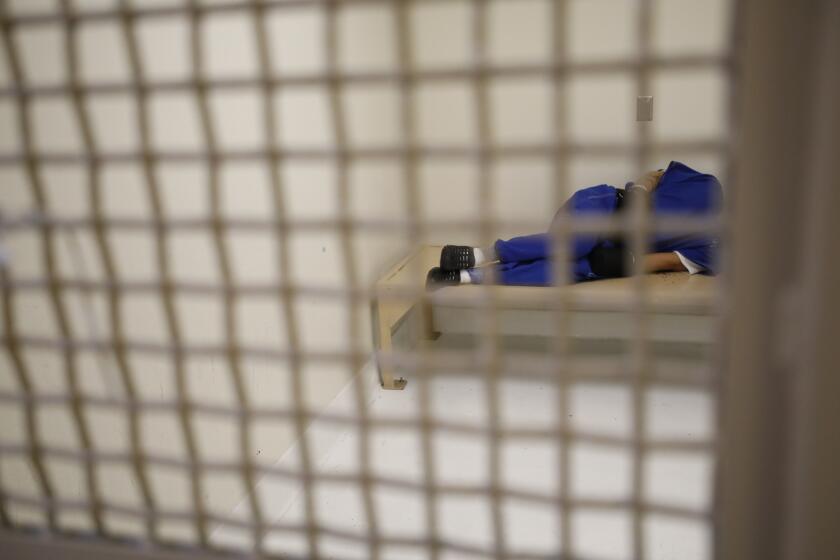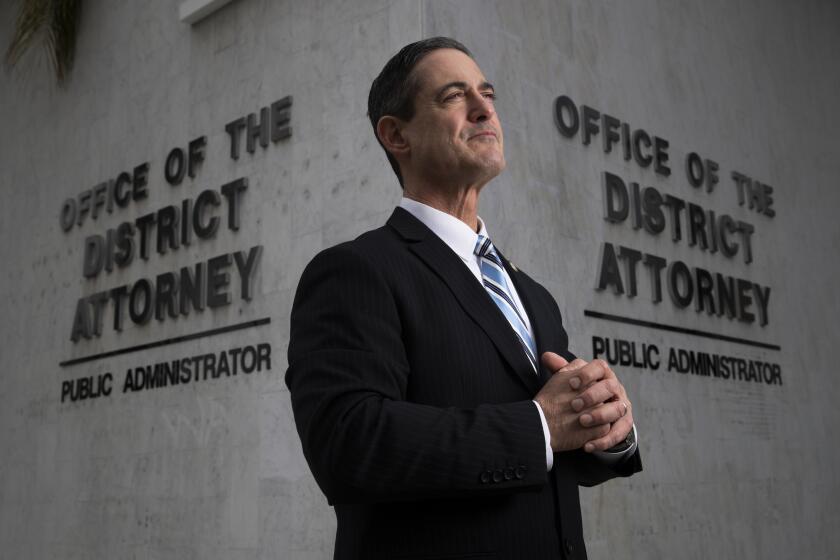Editorial: Chief Moore and other bail reform critics are wrong. Cash bail should not be a form of punishment
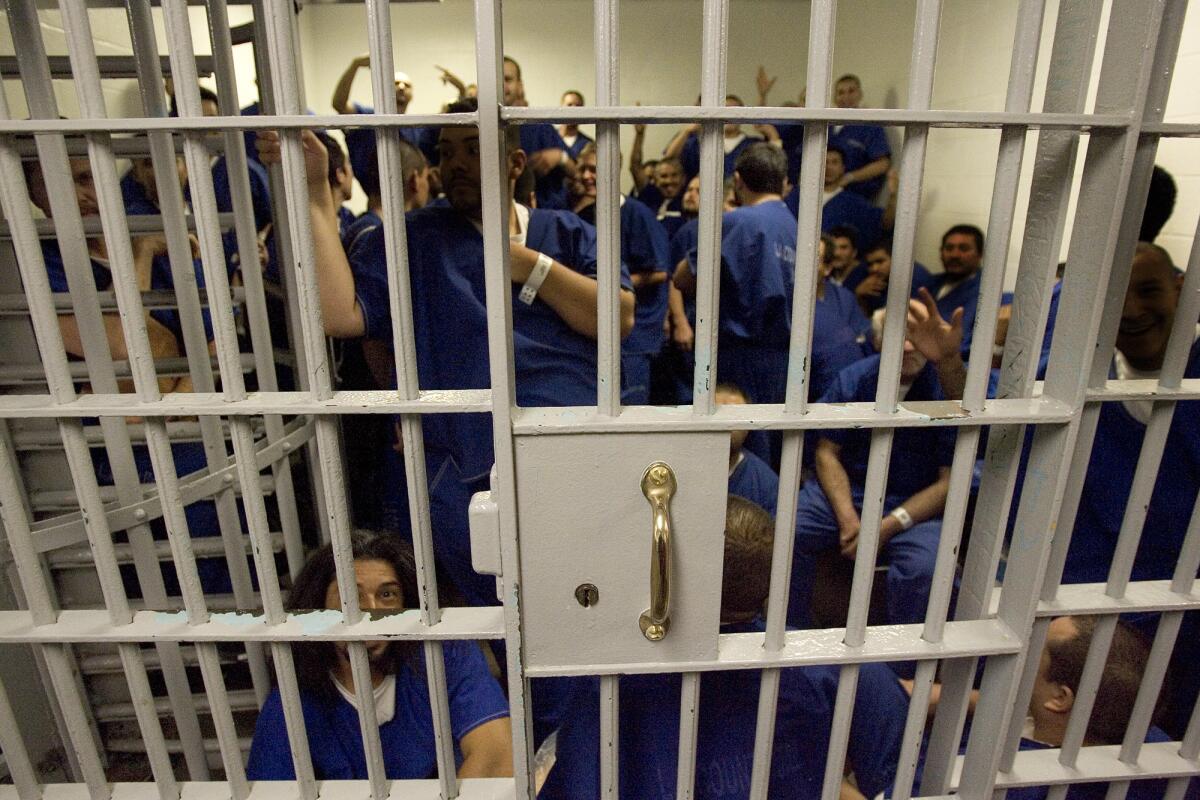
- Share via
People arrested for felonies are generally held on money bail. That means that they either pay a preset amount and then go home, or go to jail for several days to await their first court hearing.
Testifying in August in a lawsuit challenging the constitutionality of money bail, Los Angeles Police Chief Michel Moore said the value of this system is to show the public that “there’s consequences for going out and committing serious offenses, felony offenses. And that those consequences are that you face the risk of being incarcerated and punished.”
On Oct. 1 Los Angeles County transitions to a new way of administering pre-arraignment justice that doesn’t use cash bail for most crimes.
Moore said the quiet part out loud: The money bail system imposes punishment. That statement is a typical example of the law enforcement attitude about money bail. And it goes to the heart of the need for bail reform and the importance of the Los Angeles County Superior Court’s new Pre-Arraignment Release Protocol, which takes effect Oct. 1 and will eliminate money bail and pretrial detention for most suspected crimes.
There are at least two problems with Moore’s statement. First, it presumes that an accused person will be unable to pay and will go to jail. But there’s no jail before trial for those who can afford to pay. And those who deposited their full bail amount will get all their money back — even if they commit more crimes between arrest and trial.
Bail-or-jail upon arrest will largely disappear from L.A. County, correcting an injustice yet raising concerns at a time of high-profile retail thefts. First in a series.
So the punishment in Moore’s equation applies only to people without money.
The second problem is that the Constitution forbids punishment before conviction. A police accusation cannot, by itself, be transformed into evidence and then magically turn into proof beyond a reasonable doubt. A system that imposes punishment based on arrest, before the accused has an opportunity to present a defense in court, is tyranny.
The word “bail” and related terms can mean many different things. The resulting confusion helps bail reform opponents in their fight to keep the unjust status quo.
Yet it is a fundamental responsibility of government to keep people safe, and police are frustrated at the prospect of stopping criminals only to be required to immediately release them so that they might possibly commit more crimes.
This frustration is widely shared. In this era of high-profile thefts — for example, of catalytic converters from parked cars, and clothes, jewelry and other goods in mob-like smash-and-grab invasions of retail stores — most law-abiding people want to see perpetrators arrested and their crime rampages stopped as soon as possible.
Neither should anyone else. Cash bail is profoundly unjust for people facing criminal charges who don’t have money, and a pointless ritual for people, like the former president, who do.
“Seeing people released immediately after an arrest negatively impacts the credibility of our justice system, and unfortunately this does happen repeatedly,” L.A. County Sheriff Robert Luna said, testifying at the same hearing as Moore.
During the nation’s high-crime era, beginning in the 1970s, courts and lawmakers began carving back pretrial rights. The U.S. Supreme Court ruled that jailing a suspect before trial is merely a regulatory matter and not unconstitutional if it wasn’t intended as punishment. Congress altered the centuries-old purpose of bail, which was solely to ensure that the accused appears for trial, and made public safety an equally lawful purpose. States did the same.
The L.A. County Superior Court is scaling back cash bail, but it was outclassed by the Illinois Supreme Court, which upheld legislation halting it altogether.
As more people were locked up before trial even if they weren’t flight risks, jail populations skyrocketed. So did crime.
Jail overcrowding exacerbates already poor conditions. In Atlanta’s notorious Fulton County Jail, where Donald Trump paid his bail earlier this year, several inmates with no money for bail have recently died in abhorrent conditions. Thirty-three people have died in L.A.’s jails so far this year. It’s a similar story in virtually every U.S. jail.
Numerous studies demonstrate serious and lasting damage to people held under such conditions for even a few days. Sending a person there for inability to pay, regardless of intention, is at least as punitive as it is regulatory. Moore’s testimony suggests that punishment is, indeed, intended. Police unions, elected officials who oppose bail reform and representatives of the bail industry insist that money bail keeps us safe by putting the bad guys in jail — before they are convicted.
California’s emergency zero-dollar bail order does not force officials to turn criminals loose on the public.
The tug-of-war between police and bail reformers continues. Since the Superior Court unveiled its new pretrial program in July, Moore, Luna and others in law enforcement have lobbied the judges to give police more power to seek exceptions in order to avoid releasing some suspects who are otherwise eligible to be simply cited with an instruction to appear in court on the proper date. The Los Angeles Police Protective League and other police unions are urging L.A. residents to attend the Board of Supervisors meeting on Tuesday to share their concerns about the changes to the county’s cash bail system.
L.A. County’s improved pretrial justice program should erase the twin failures of the current system: parceling out liberty based on wealth, which is a violation of the guarantee of equal protection, and imposing punishment without trial, a violation of the presumption of innocence and the guarantee of due process. At the same time, it should provide individualized supervision and services for defendants pretrial without unnecessarily locking them up.
More to Read
A cure for the common opinion
Get thought-provoking perspectives with our weekly newsletter.
You may occasionally receive promotional content from the Los Angeles Times.
